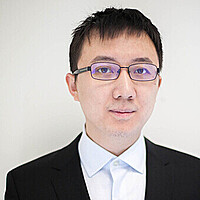- Undergraduate
- Graduate
- Research
- News & Events
- People
- Inclusivity
- Jobs
Back to Top Nav
Back to Top Nav
Back to Top Nav
Qing will present global nonconvex optimization theory and guaranteed algorithms for efficient learning of low-complexity models from high-dimensional data.

Abstract: Today we are collecting a massive amount of data in forms of images and videos, that we want to learn from the data themselves to extract useful information and to make predictions. The data are high-dimensional, but often possess certain low-dimensional structures (e.g., sparsity). However, learning these low-complexity models often results in highly nonconvex optimization problems, where in the past our understandings of solving them were very limited. In the worst case, optimizing a nonconvex problem is NP-hard. In this talk, we present global nonconvex optimization theory and guaranteed algorithms for efficient learning of low-complexity models from high-dimensional data. For several important problems in imaging science (i.e., sparse blind deconvolution) and representation learning (i.e., convolutional/overcomplete dictionary learning), we show that the underlying symmetry and low-complexity structures avoid the worst-case scenarios, leading to benign global geometric properties of the nonconvex optimization landscapes. In particular, for sparse blind deconvolution that aims to jointly learn the underlying physical model and sparse signals from convolutions, the geometric intuitions lead to efficient nonconvex algorithms, with linear convergence to target solutions. Moreover, we extended our geometric analysis to convolutional dictionary learning based on its similarity with overcomplete dictionary learning, providing the first global algorithmic guarantees for both problems. Finally, we demonstrate our methods on several important applications in scientific discovery, and draw connections to learning deep neural networks. This talk is mainly based on one paper appeared in NeurIPS’19 (spotlight), and two papers accepted by ICLR’20 (one oral).
Bio: Qing Qu is a Moore-Sloan data science fellow at the Center for Data Science, New York University. He received his Ph.D. from Columbia University in Electrical Engineering in Oct. 2018. He received his B.Eng. from Tsinghua University in Jul. 2011, and an M.Sc.from the Johns Hopkins University in Dec. 2012, both in Electrical and Computer Engineering. He interned at U.S. Army Research Laboratory in 2012 and Microsoft Research in 2016, respectively. His research interest lies at the intersection of the foundation of data science, machine learning, numerical optimization, and signal/image processing. His research focuses on developing computational methods for learning low-complexity models/structures from high dimensional data, leveraging tools from machine learning, numerical optimization, and high dimensional probability/geometry. He is also interested in applying these data-driven methods to various engineering problems in imaging sciences, scientific discovery, and healthcare. He is the recipient of Best Student Paper Award at SPARS’15 (with Ju Sun and John Wright), and the recipient of Microsoft Ph.D. Fellowship 2016-2018 in machine learning.
Events are free and open to the public unless otherwise noted.